Book contents
- Frontmatter
- Foreword
- Introduction
- 1 The Origin of the Origin
- 2 Darwin’s Analogy between Artificial and Natural Selection in the Origin of Species
- 3 Variation and Inheritance
- 4 Darwin’s Theory of Natural Selection and Its Moral Purpose
- 5 Originating Species: Darwin on the Species Problem
- 6 Darwin’s Keystone: The Principle of Divergence
- 7 Darwin’s Difficulties
- 8 Darwin’s Geology and Perspective on the Fossil Record
- 9 Geographical Distribution in the Origin of Species
- 10 Classification in Darwin’s Origin
- 11 Embryology and Morphology
- 12 Darwin’s Botany in the Origin of Species
- 13 The Rhetoric of the Origin of Species
- 14 “Laws impressed on matter by the Creator”? The Origin and the Question of Religion
- 15 Lineal Descendants: The Origin’s Literary Progeny
- 16 The Origin and Political Thought: From Liberalism to Marxism
- 17 The Origin and Philosophy
- 18 The Origin of Species as a Book
- Bibliography
- Index
2 - Darwin’s Analogy between Artificial and Natural Selection in the Origin of Species
Published online by Cambridge University Press: 28 January 2009
- Frontmatter
- Foreword
- Introduction
- 1 The Origin of the Origin
- 2 Darwin’s Analogy between Artificial and Natural Selection in the Origin of Species
- 3 Variation and Inheritance
- 4 Darwin’s Theory of Natural Selection and Its Moral Purpose
- 5 Originating Species: Darwin on the Species Problem
- 6 Darwin’s Keystone: The Principle of Divergence
- 7 Darwin’s Difficulties
- 8 Darwin’s Geology and Perspective on the Fossil Record
- 9 Geographical Distribution in the Origin of Species
- 10 Classification in Darwin’s Origin
- 11 Embryology and Morphology
- 12 Darwin’s Botany in the Origin of Species
- 13 The Rhetoric of the Origin of Species
- 14 “Laws impressed on matter by the Creator”? The Origin and the Question of Religion
- 15 Lineal Descendants: The Origin’s Literary Progeny
- 16 The Origin and Political Thought: From Liberalism to Marxism
- 17 The Origin and Philosophy
- 18 The Origin of Species as a Book
- Bibliography
- Index
Summary
Darwin opened the Origin of Species precisely where he claimed that his recognition of the engine of evolutionary change itself originated: with the transforming effects that breeders' selection of preferred characters had on their plants and animals. In the first chapter of Origin, titled “Variation under Domestication,” Darwin lays the groundwork for his analogy between artificial and natural selection by asserting that “the great power of this principle of selection is not hypothetical,” and that through selection, either methodological or unconscious, breeders fundamentally and permanently alter the domesticated plants and animals in their charge (Origin, 30). Motivated by their interest in enabling organisms that possess desired traits to produce offspring, which would presumably share their parents' preferred characteristics, breeders select favored individuals for reproduction and destroy or otherwise discourage the perpetuation of those that lack desired qualities. Darwin argued that the conditions of life in the wild allow for a struggle for existence within and between species that likewise tends to select for those characteristics that permit survival and reproduction and against those that tend to hinder organisms' opportunity to survive long enough to reproduce and pass along their particular qualities. In later chapters - in particular, Chapter 4, “Natural Selection” - these arguments coalesce into his assertion that just as breeders could use selection to change the characters of a particular breed, nature too could select and thus modify a wild species.
- Type
- Chapter
- Information
- The Cambridge Companion to the 'Origin of Species' , pp. 15 - 29Publisher: Cambridge University PressPrint publication year: 2008
- 2
- Cited by



